Can Birds Eat Grapes? What You Need to Know!
Last Updated on
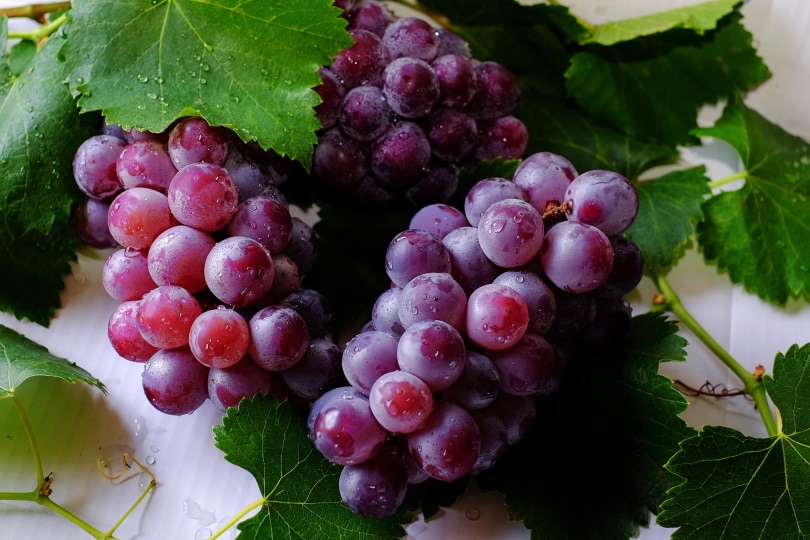
If you love feeding wild birds and wonder if you can give them grapes, you sure can! Birds enjoy eating many different types of fruits and seeds. Grapes are among the safest fruits to feed birds because they’re not harmful or toxic. The nice thing about grapes is that they contain lots of fructose, making them sweet and tasty for birds to enjoy.

How to Prepare Grapes for Your Birds
Because many fruits, including grapes, are sprayed with pesticides, it’s crucial to wash grapes thoroughly before feeding them to birds.
You can make a fruit-wash solution yourself to use for cleaning your grapes. To do this, mix one part of baking soda or vinegar with three parts of water. Once you wash the grapes with the solution, give them one last rinse with clean water.
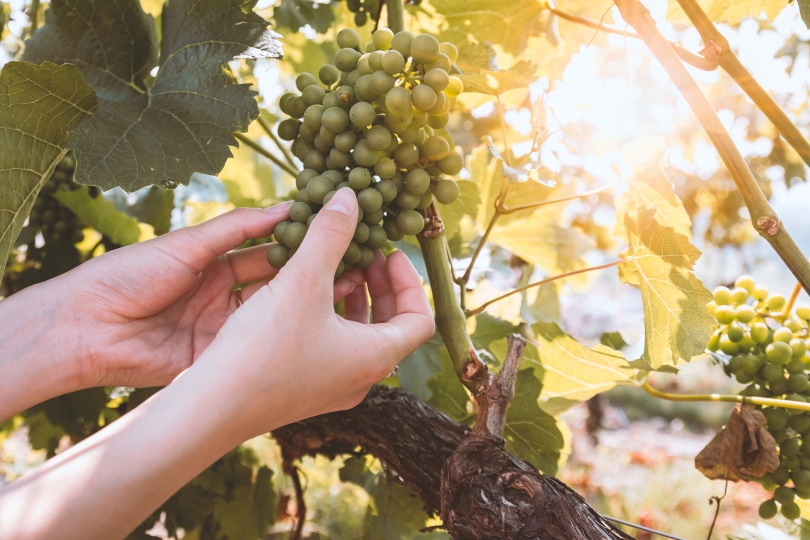
Benefits of Feeding Grapes to Your Bird
Grapes are full of nutrients and vitamins that are beneficial for birds. Grapes also contain a high amount of vitamin C, which helps birds fight off illness and infections just like it does for humans. The vitamin K in grapes helps maintain healthy blood and prevent bone issues. Additionally, vitamin K keeps a bird’s calcium levels in check and is important for eggshell density.
Grapes are also low in sodium and help maintain good electrolyte balance in a bird’s body. Because they’re loaded with antioxidants, grapes can also help keep birds free from cancer.
Birds Aren’t Picky About Grapes
Birds aren’t fussy over what color grapes they eat—they’ll gladly consume both red and white grapes. But just like people, birds prefer eating fresh, juicy fruits and berries. When buying grapes, look for the freshest, plumpest ones you can find and wash them thoroughly after bringing them home.
Even though birds love grapes, you should only feed them to wild birds as a treat. You should limit how many grapes you provide birds because they’re high in sugar and can encourage birds to become overweight.
A good habit to get into is to treat your local birds to a few grapes once or twice a week. If any of the birds that visit your yard are small, cut the grapes into tiny pieces so they can digest them more easily.
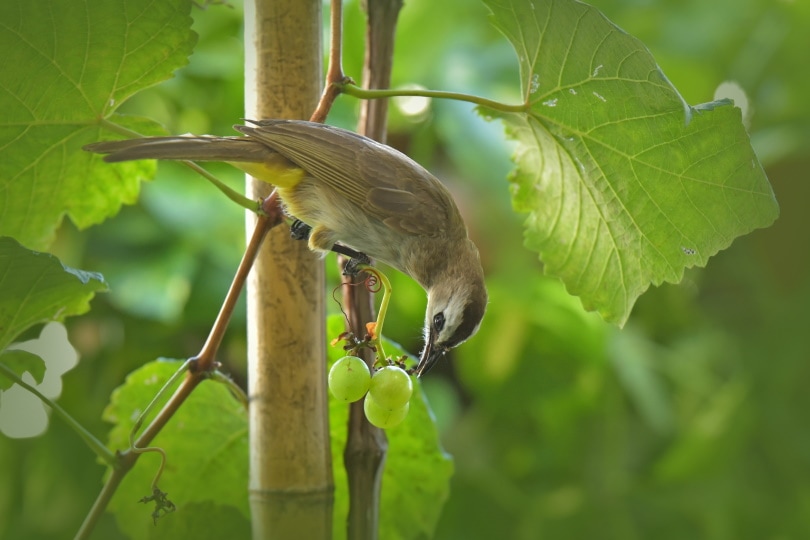
What Types of Birds Eat Grapes?
There are many types of wild birds living in North America that enjoy eating grapes. Some of the most common birds that eat grapes include:
- Bluebirds
- American Robins
- Thrashers
- Catbirds
- Orioles
- Waxwings
- Woodpeckers
- Sapsuckers
- Warblers
- Towhees
Some birds like sparrows, grosbeaks, and buntings primarily eat seeds. However, these birds occasionally eat fruits, so don’t be surprised if you see them pecking away at the grapes you put out for your outdoor birds.
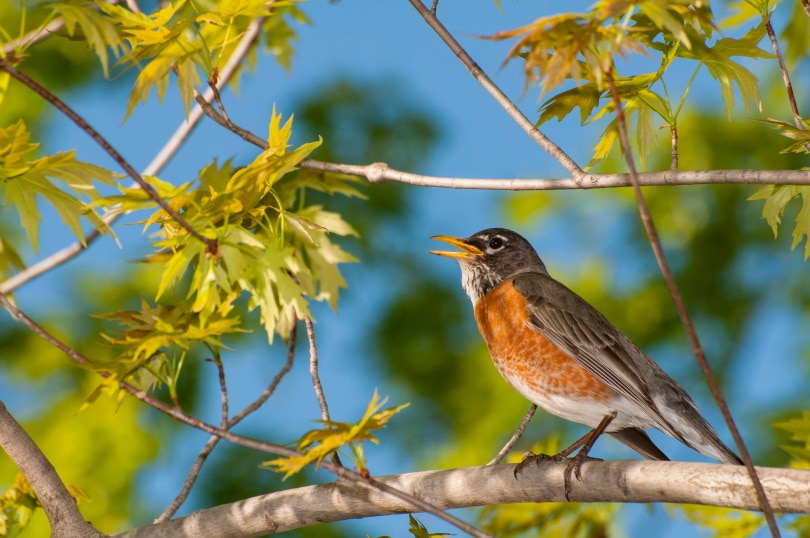
Other Fruits and Berries Birds Enjoy Eating
Many birds in the wild enjoy eating lots of fruits and berries besides grapes. Some potential sweet treats you can give them are listed here:
- Blueberries
- Cranberries
- Raspberries
- Apples
- Oranges
- Cherries
- Pears
- Bananas
- Mangoes
- Papayas
- Cantaloupe
- Kiwis
- Pineapples
You can even feed birds dried fruit like raisins, currants, or dried cherries. If you don’t want to dry your own fruit for your backyard birds, you can buy wild bird food containing dried fruit.
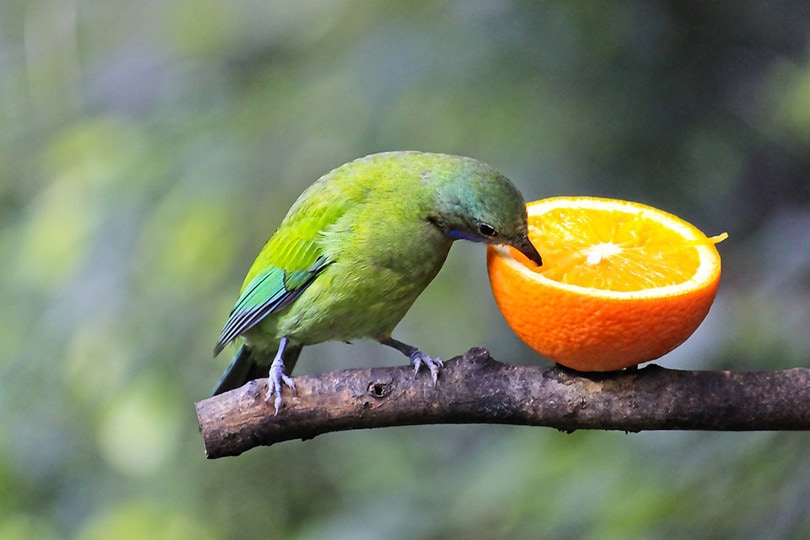
Other Treats You Can Feed to Wild Birds
Your leftover kitchen scraps can provide wild birds with some essential fats and carbohydrates that may be missing from their diet. Fats and carbs are especially important during the winter season when foraging is tough and birds need extra energy to stay warm.
You can place a few different table scraps on your bird table or ground feeder. You can also mix leftover food scraps with suet and place it in your suet basket. So, what kitchen scraps can you feed your birds? It’s fine to feed wild birds the following items, as long as they’re fresh.
- Mild cheese
- Cooked potatoes without peelings
- Cooked carrots
- Cooked broccoli
- Cooked cabbage
- Cooked rice
- Cooked pasta
- Uncooked oatmeal
- Dry unsweetened breakfast cereal
While all these things are safe for wild birds to eat, don’t give them any uncooked raw vegetables because they’re difficult to digest. Also, avoid giving your birds any uncooked meat since it can make them sick.
Related Read: 16 Birds That Eat Snakes (With Pictures)

Wild Birds Require Good Diets
To ensure they’re healthy, birds of all types need to eat a regular nutritious diet consisting of protein, carbohydrates, fiber, lipids, minerals, and vitamins. Fortunately, birds living in the wild get most of their nutritional needs met by foraging for food.
It’s perfectly fine to supplement the diet of your outdoor birds by treating them to small amounts of fruits, vegetables, and some kitchen scraps. If you’re unsure if you should feed something to the wild birds in your area, check with your local birding club to find out. You can also check with the National Audubon Society—a nationwide organization dedicated to protecting birds and their habitats.

In Conclusion
Birds can be fed grapes without worry since both red and white grapes are non-toxic and safe for them to eat. Be sure to wash the grapes thoroughly before feeding them to your birds to remove any harmful pesticides. Don’t forget that birds love nibbling on a variety of fresh fruits and vegetables, so treat your feathered friends now and then to something special!
Featured Image Credit: Piqsels
About the Author Robert Sparks
Robert’s obsession with all things optical started early in life, when his optician father would bring home prototypes for Robert to play with. Nowadays, Robert is dedicated to helping others find the right optics for their needs. His hobbies include astronomy, astrophysics, and model building. Originally from Newark, NJ, he resides in Santa Fe, New Mexico, where the nighttime skies are filled with glittering stars.
Related Articles:
What Is the Best Binocular Magnification for Hunting? Optical Features Explained
Can You Use Binoculars to Look At Stars? How to Choose the Right Pair
How to Clean a Refractor Telescope: Step-by-Step Guide
How to Clean a Telescope Eyepiece: Step-by-Step Guide
How to Clean a Rifle Scope: 8 Expert Tips
Monocular vs Telescope: Differences Explained (With Pictures)
What Is a Monocular Used For? 8 Common Functions
How to Clean a Telescope Mirror: 8 Expert Tips
